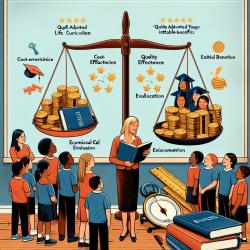As practitioners dedicated to fostering the best possible outcomes for children with Autism Spectrum Disorder (ASD), staying informed about the latest research is crucial. A recent study titled Theory of Mind Profiles in Children With Autism Spectrum Disorder: Adaptive/Social Skills and Pragmatic Competence provides valuable insights into how different profiles of Theory of Mind (ToM) abilities impact children with ASD. This blog will distill key findings from this research and offer practical strategies for implementing these insights in clinical practice.
Understanding Theory of Mind in ASD
The study highlights that ToM, the ability to attribute mental states to oneself and others, is not uniformly impaired in children with ASD. Instead, children with ASD exhibit a range of ToM abilities that can be categorized into distinct profiles. Specifically, the research identified two primary profiles among children with ASD without intellectual disability (ID): those with "Higher ToM abilities" and those with "Lower ToM abilities."
Key Findings
- Children in the "Higher ToM abilities" group performed similarly to typically developing (TD) children on explicit ToM tasks but struggled with applying this knowledge in real-world social interactions.
- The "Lower ToM abilities" group showed significant impairments in both explicit and applied ToM skills compared to their TD peers.
- Differences in ToM abilities were linked to variations in adaptive behavior, social skills, and pragmatic competence. Children with lower ToM abilities exhibited more severe ASD symptoms and poorer adaptive and pragmatic skills.
Implications for Practice
These findings suggest several actionable strategies for practitioners:
- Tailored Assessments: Incorporate both explicit and applied ToM tasks in assessments to capture a comprehensive picture of a child's ToM abilities. This approach can help identify specific areas of need and inform targeted interventions.
- Focus on Real-World Application: Develop interventions that emphasize the application of ToM skills in everyday social interactions. This might include role-playing scenarios, social stories, and peer-mediated interventions to enhance the ecological validity of ToM training.
- Holistic Approach: Address the broader context of social functioning by incorporating adaptive and pragmatic skills training. Enhancing these areas can support better overall social outcomes for children with ASD.
Encouraging Further Research
The study underscores the importance of understanding the heterogeneity in ToM abilities among children with ASD. Further research is needed to explore the interplay between ToM, adaptive behavior, and pragmatic competence. Practitioners are encouraged to stay engaged with ongoing research and consider participating in studies that aim to refine our understanding of these complex relationships.
To read the original research paper, please follow this link: Theory of Mind Profiles in Children With Autism Spectrum Disorder: Adaptive/Social Skills and Pragmatic Competence.










